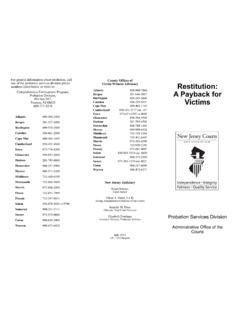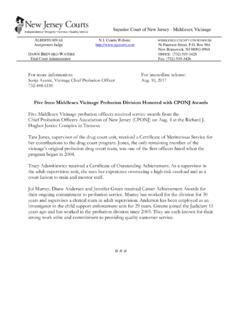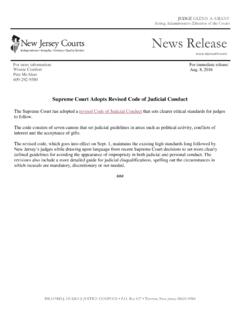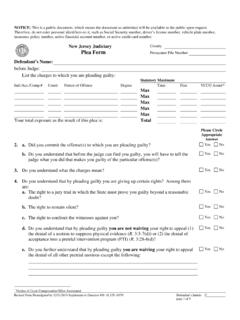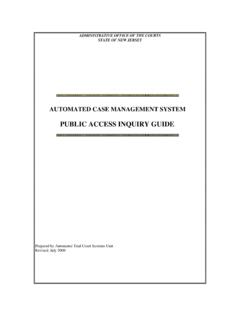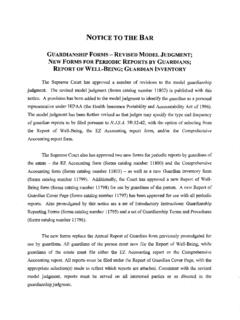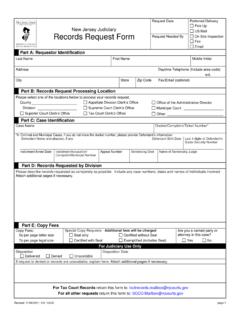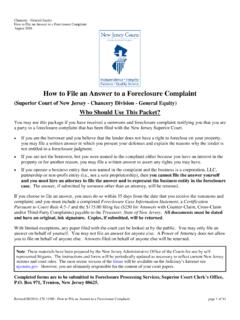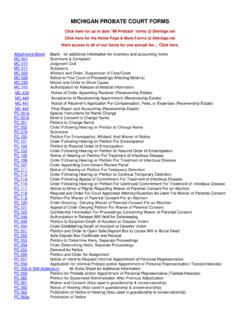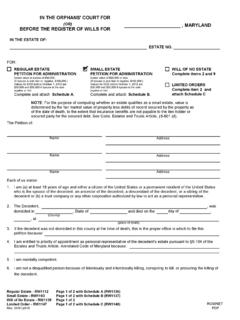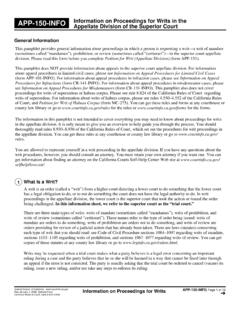Transcription of How to Apply for Guardianship of the Person and Estate ...
1 Revised 02/2017, CN 10558 (Adult Guardianship Person & Estate ) page 1 of 35 Chancery probate How to Apply for Guardianship of the Person and Estate (Property) of an Individual Eligible for Services from the Division of Developmental Disabilities (DDD) February 2017 How to Apply for Guardianship of the Person and Estate (Property) of an Individual Eligible for Services from the Division of Developmental Disabilities (DDD) (Title 30 Guardianship ) (Superior Court of New Jersey - Chancery Division - probate Part) Who Should Use This Packet? You may use this packet if you are seeking appointment of a guardian of the Person and Estate (property) for an individual with a developmental disability who has been determined eligible for services from the Division of Developmental Disabilities (DDD).
2 You should only use this packet if ALL of the following statements are true: The Person alleged to be incapacitated is eligible for and/or receiving services from the DDD; AND You are requesting that the court appoint a guardian of the Person and the Estate (property), not a guardian of the Person only. You should NOT use this packet if you are seeking appointment of a guardian of the Person only. If you wish to be guardian of the Person only, you should use the packet entitled How to Apply for Guardianship of the Person of an Individual Eligible for Services from the Division of Developmental Disabilities (DDD).
3 Note: These materials have been prepared by the New Jersey administrative Office of the Courts for use by self-represented litigants. The guides, instructions, and forms will be periodically updated as necessary to reflect current New Jersey statutes and court rules. The most recent version of the forms will be available at the county Surrogate s Office or at However, you are ultimately responsible for the content of your court papers. Completed forms are to be submitted to the Surrogate s Office in the county where you are filing your case. A list of Surrogates Offices is provided at Revised 02/2017, CN 10558 (Adult Guardianship Person & Estate ) page 2 of 35 Things to Think About Before You Represent Yourself in Court Try to Get a Lawyer The court system can be confusing and it is a good idea to get a lawyer if you can.
4 The law, the proofs necessary to present your case, and the procedural rules governing cases in the Chancery Division, probate Part are complex. Since the civil rights, well -being or financial security of an alleged or adjudicated incapacitated Person may be at stake, many litigants appearing in the Chancery Division, probate Part have a lawyer. It is recommended that you make every effort to obtain the assistance of a lawyer. If you cannot afford a lawyer, you may contact the legal services program in your county to see if you qualify for free legal services. Their telephone number can be found online or in your local yellow pages under Legal Aid or Legal Services.
5 If you do not qualify for free legal services and need help in locating an attorney, you can contact the bar association in your county. That number can also be found in your local yellow pages. Most county bar associations have a Lawyer Referral Service. The County Bar Lawyer Referral Service can supply you with the names of attorneys in your area willing to handle your particular type of case and will sometimes consult with you at a reduced fee. There are also organizations of minority lawyers throughout New Jersey, as well as organizations of lawyers who handle specialized types of cases.
6 Ask your county court staff for a list of Lawyer Referral Services that include these organizations. If you decide to proceed without an attorney, these materials explain the procedures that must be followed to have your papers properly filed and considered by the court. These materials do not provide information nor other procedural and evidentiary rules governing Guardianship matters. What You Should Expect If You Represent Yourself While you have the right to represent yourself in court, you should not expect special treatment, help or attention from the court. The following is a list of some things court staff can and cannot do for you.
7 Please read it carefully before asking court staff for help. We can explain and answer questions about how the court works. We can tell you what the requirements are to have your case considered by the court. We can give you some information from your case file. We can provide you with samples of court forms that are available. We can provide you with guidance on how to fill out forms. We can usually answer questions about court deadlines. We cannot give you legal advice. Only your lawyer can give you legal advice. We cannot tell you whether or not you should bring your case to court.
8 We cannot give you an opinion about what will happen if you bring your case to court. We cannot recommend a lawyer, but we can provide you with the telephone number of a local lawyer referral service. We cannot talk to the judge for you about what will happen in your case. We cannot let you talk to the judge outside of court. We cannot change an order issued by a judge. Keep Copies of All Papers Make and keep copies of all completed forms and documents related to your case. Revised 02/2017, CN 10558 (Adult Guardianship Person & Estate ) page 3 of 35 Definitions of Words Used in This Packet Alleged Incapacitated Person (AIP) - The alleged incapacitated Person (or AIP) is the individual over whom the plaintiff(s) is/are seeking Guardianship .
9 Certification - A certification is a statement that certain facts are true to the best of the knowledge of the Person making the statement. It is like an affidavit, but it is not sworn before a notary or other authorized Person . County of Settlement - The county of settlement is the county responsible for a share of the charge incurred for services provided to persons unable to pay. Typically, this is the AIP s county of residence at the time of application for DDD services. However, it is possible that the county of residence and county of settlement may be different depending on the residential history of the AIP.
10 County Surrogate The county surrogate is an elected Constitutional Officer who serves as judge of the Surrogate s Court for uncontested probate and Estate matters. A Surrogate also serves as Deputy Clerk to the Superior Court for the probate Part, including guardianships of incapacitated adults, as well as adoptions in the Family Part. Docket Number - A docket number is the number the court assigns to your case so that it may be identified and located easily. Once you have a docket number, you must include it on all your communications with the court. File - To file means to give the appropriate forms and fee to the court to begin the court s handling of your case.
